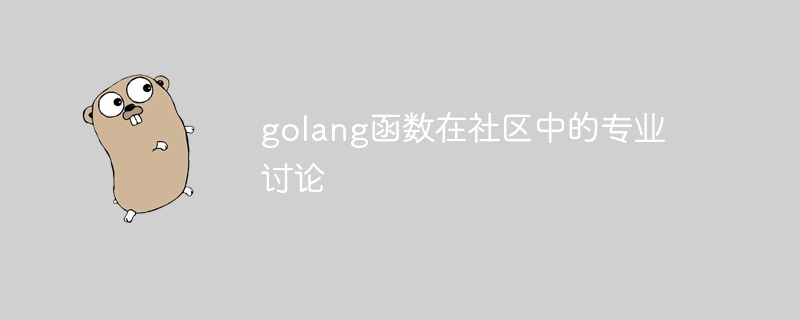
Go functions have sparked discussions in the community, mainly focusing on clarity, parameter optimization, parallelism, library management, etc. Functions are encapsulated into reusable units in the Go language. The specification of naming conventions, simplification of parameters and return values, implementation of concurrency safety, and package organization and management are all hot topics.

Go functions are a basic part of the Go language, which allow programmers to encapsulate blocks of code into a Reuse unit. In the Go community, functions have always been a topic of active discussion, especially in the following aspects:
1. Clarity and readability of functions
Go Functions are usually named by a single lowercase word and clearly indicate their purpose. However, readability can become an issue when function names become long or contain multiple words. There has been extensive discussion in the community about naming conventions to resolve this issue.
2. Function parameters and return values
Function parameters and return values are an important part of defining a function interface. The community often discusses best practices such as naming conventions, parameter types, and how to return errors.
3. Parallelism and Concurrency of Functions
Go language is known for its powerful concurrency features and its functions can be easily executed in parallel. The community often discusses how to write concurrency-safe functions and how to handle errors in concurrent scenarios.
4. Organization and management of function libraries
Go functions are often organized in packages, which helps manage and reuse code. There is a lot of discussion in the community about package structure, code layout, and version control.
Practical case:
The following is an example of Go function in practice:
package main
import "fmt"
// 定义一个计算两个数和的函数
func sum(a, b int) int {
return a + b
}
func main() {
// 调用函数并打印结果
result := sum(10, 20)
fmt.Println(result) // 输出 30
}In this example, sum The function encapsulates the logic of calculating the sum of two numbers. It is easily reusable via function calls and can be passed different arguments to produce different results.
Discussions about functions continue in the community, and best practices and conventions continue to evolve as the Go language evolves. Participating in these discussions is extremely valuable for Go programmers because it helps them write clearer, more readable, and more efficient code.
The above is the detailed content of Professional discussion of golang functions in the community. For more information, please follow other related articles on the PHP Chinese website!
 How to define variables in golang
How to define variables in golang
 What are the data conversion methods in golang?
What are the data conversion methods in golang?
 What are the commonly used libraries in golang?
What are the commonly used libraries in golang?
 What is the difference between golang and python
What is the difference between golang and python
 What to do if temporary file rename fails
What to do if temporary file rename fails
 What format is png
What format is png
 Why does the computer automatically restart?
Why does the computer automatically restart?
 Compatibility checker
Compatibility checker




